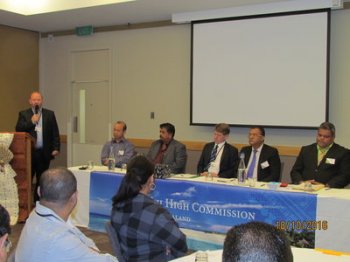
The event, organised by the Fiji High Commission in New Zealand, brought together more than 35 key stakeholders from Government, Non-Government and the private sector in Auckland on 19-20 October.
The forum marked a deliberate reboot of the fresh produce trade relationship between Fiji and New Zealand. The relationship had flagged in recent years due to a range of political, economic and weather related supply issues, but open, friendly and frank discussions on the current state of the industry mapped out a way forward in the outcomes from the meeting.
Fiji Government’s Minister for Agriculture, Inia Seruiratu, opened the meeting and said the Government was doing its best to address Fiji’s food and economic security. There was a need for more interaction with stakeholders to better understand the needs of fresh producers and agencies were holding dialogue with stakeholders to identify pathways and network opportunities. Seruiratu discussed various programmes and projects introduced to turn agriculture around.
Fiji’s New Zealand High Commissioner, Filimone Waqabaca, highlighted continuing trade imbalance in favour of New Zealand and how to close the gap. Fiji is New Zealand’s biggest trading partner in the Pacific, importing NZD $400 million annually from New Zealand whilse exporting NZD $55 million to New Zealand.
Fiji’s exports in fresh produce were worth $14.2 million between 2011 and 2015. Waqabaca compared Fiji’s export figures in roots and tubers, fruit, nuts and ginger with other Pacific countries and asked how could the country take some of the market share from those competitors.
He challenged exporters to double Fiji’s export figures to $30 million in five years.
Tourism had overtaken trade as the country’s main earner, but it needed to build a firm and sustainable platform to move forward together and realise opportunities. Agriculture could lift the economic growth of Fiji and had the potential to grow larger than Fiji’s tourism industry, he said.
Agriculture accounted for 10.5% of Fiji’s GDP and the country could aim for 20% of GDP. If Fiji could set itself up to satisfy the needs of the exporters and importers they could operationalise the vision, ‘Together we can’.
Pacific Trade & Invest (PT&I) Auckland Trade Commissioner, Michael Greenslade, and Trade Development Manager, Ian Furlong, facilitated the morning and afternoon panel presentations to identify the issues for New Zealand importers and Fijian exporters of fresh produce. The outcomes were summarised to produce an issues and solutions matrix at the end of the meeting.
Several issues facing Fiji exporters and New Zealand importers were identified by the participants.
Sam Yip, owner of Mellow Foods, a major Auckland importer of taro and cassava for the past 25 years, pinpointed a range of issues. Quality, consistent supply, volume and price were problematic although it had improved gradually over the past three years, he said. But faced with the damaging impact of Cyclone Winston, the past six months had been the hardest he had experienced in 25 years. Yip favoured exporter licensing to maintain high quality standards.
Wirendra Reddy of Fiji Foods identified issues with the booking system within the New Zealand Ministry of Primary Industries that affected the shelf life of fresh produce when the inspection of such perishable merchandise was delayed. He also identified a need for basic training for Fiji farmers. To double the market share in New Zealand, agriculture had to start from scratch, finding people wanting to export and meeting quality standards.
Dr Stephen Butcher from Ministry of Primary Industries agreed to check into booking times for inspections. However, he said if they could apply systems to meet biosecurity systems in New Zealand, focus on fewer products, bigger volume at good prices this could address issues in the supply chain.
Fiji Government Agricultural official, Vatimi Rayalu, said Cyclone Winston had exposed issues not just around exporting fresh produce but food security for Fiji. Eighty percent of growers were local subsistence farmers supplying local markets, with the excess exported. Pre-Cyclone Winston, taro prices were $7, but due to high demand and decreased supply, the price had increased to $30.
Rayalu said they needed to fine tune the production of fresh produce and organise the farmers with better resources and access to finance to gain the maximum impact. The Government was working on clustering concepts for farmers to better respond to demand.
Rizwan Khan of Fiji Fresh Produce Exporters Association has 23 members who turned over $48 million in exports. Licencing exporters was critical for Fiji in moving forward, he said. In addition, the creation of platforms for linkages between exporters and importers and working with development partners was important, he added.
Discussions continued throughout the afternoon and Day Two was set aside for individual business meetings.
Source: PT&I



 Classifieds
Classifieds

